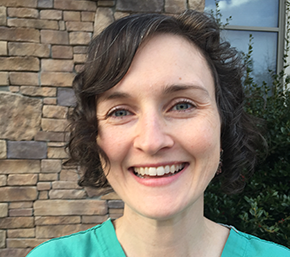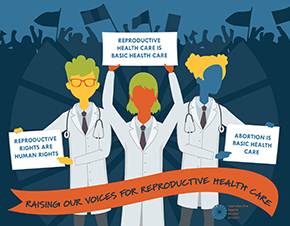Nov 06

Help Us Protect Access to Sexual and Reproductive Health Care Today!
A report-back from Organizing Associate Lily Trotta
The Family Medicine Midwest (FMM) conference brought together clinicians from across the heartland gather to connect, learn, and engage in Illinois this November, and RHAP was there to represent! National Organizer, Laura Riker, moderated a panel on our Miscarriage Care Initiative (MCI), a RHAP program that supports primary care organizations to provide all options for treating early pregnancy loss. Joining Laura were two Clinical Champions – MCI participants who led the charge in introducing patient-centered early pregnancy loss care into their practice sites. The panel explored the relational and logistical challenges of integrating MCI into sites like community health centers and residency training programs, as well as the professional fulfillment of expanding access to this essential care to their patients.
In partnership with the Midwest Access Project and the Illinois Academy of Family Physicians, RHAP hosted an evening reception at the conference following Saturday’s schedule of events. We provided new folks with an opportunity to learn more about the Reproductive Health Access Network and reconnected with Network members from Illinois, Indiana, Minnesota, and throughout the Midwest. A short but sweet conference weekend at FMM rallied us to continue working together to expand the reach of programs like our Miscarriage Care Initiative and support primary care clinicians from coast to coast.
A report-back from Organizer Hailey Broughton-Jones
“Justice is not a noun, justice is a verb.” – Activist and Politician, Stacey Abrams, LTAS 2019 Keynote Speaker
In October, I had the pleasure of attending Sister Song’s Let’s Talk About Sex Reproductive Justice Conference in Atlanta, GA. Let’s Talk About Sex (LTAS) is the largest gathering in the country of womxn of color who are organizing around reproductive health, rights, and justice issues (1).
The conference was a call-to-action centered around accountability, transcendence, and liberation. During the opening plenary, activists invited attendees to reflect on what accountability looks like in practice. They envisioned accountability as an aspiration, a promise to ourselves and each out. The panelists defined accountability as a day-to-day practice that makes us commit to wading in the deep water with others and owning our impact. The opening ceremony and plenary provided me with an anchoring and connection to other attendees that I have not experienced at other conferences.
Over the course of two days, there were over 75 sessions – selecting which workshops to attend was a bit difficult! One workshop I attended was led by Chican@ and Mexican@ midwives discussing how they are organizing along both sides of the US-Mexico border to dismantle obstetric violence (Luna Tierra) (2). Other workshops included a panel on best practices for how our organizations can live the values we promote and a presentation on how a Reproductive Justice (RJ) lens can be used to strengthen the security and safety of abortion care providers.
Midway through the conference, we hosted a Network gathering where Network members and colleagues were able to connect and catch up after a marathon of conferences. The social gathering was a great time to hear updates from Network members organizing and working in Washington, Virginia, New York, Pennsylvania, and Georgia.
As an Organizer, often working within the power systems of medical institutions and health care, attending LTAS helped me re-imagine how collective power can be built and reflect on my own practice of accountability. Some questions that I am left with include: What does it look like to own the limitations of the reproductive health field while learning from RJ leaders and incorporating RJ principles in our movement of organizing, play, and work?
(1) A note about language: In this context, I am using the term “womxn” as a gender-expansive term that is inclusive of cisgender women, genderqueer, and non-binary folks.
(2) I am using the gender-expansive language of the presenters who used “Chican@” and “Mexican@” to describe the communities and midwives they work with.
 When I first moved to Asheville, North Carolina, I didn’t know what to expect. I have no connections to the South. I moved here to do my residency in family medicine, and I ended up staying. I am now one of the few abortion providers in my region.
When I first moved to Asheville, North Carolina, I didn’t know what to expect. I have no connections to the South. I moved here to do my residency in family medicine, and I ended up staying. I am now one of the few abortion providers in my region.
Asheville is a progressive oasis in an abortion desert. I see patients from Kentucky, West Virginia, Tennessee, and South Carolina. I know people who have traveled over four hours to reach my clinic. Sometimes it’s because their nearest clinic is too full, sometimes it’s because my clinic is the closest option around.
Due to logistical and legislative restrictions in my region, I can’t bundle all of my clinical services and provide full-spectrum reproductive health care within one practice. Everything is siloed. I’ve treated a patient in my family medicine practice, only to see her later at an abortion clinic. When she saw me, she gave me an enormous hug, like it was a huge relief to see me, someone she trusted to provide her the care she needed.
I believe that’s the beauty of family medicine in reproductive health care. We treat people in all stages of life. We know their families, their medical histories. Some of my patients open up to me with the most intimate details of their life. Given all of this information, I feel I am uniquely positioned to provide care that considers the patient before, during, and well after their abortion.
I believe that reproductive health care doesn’t have to be separate from other forms of health care, especially in family medicine. That’s why I lead the Reproductive Health Access Network‘s North Carolina cluster. In this dire political climate for abortion care givers, we need allies. Our NC cluster is a place of support, an automatic community of like-minded clinicians working towards the same goal.
If you’re a primary care clinician interested in integrating reproductive health care into your practice, you can email RHAP’s National Organizer Laura Riker to get started.
Dr. Julia Oat-Judge co-leads the Reproductive Health Access Network‘s North Carolina cluster.
 From now until December 31st, RHAP is raising funds to mobilize local leaders to raise their voices to protect and expand access to reproductive health care. In 2020, we’re activating our nationwide Network of more than 3,700 clinicians to advocate to protect reproductive health care in their state – and we’re counting on your support. Help us mobilize primary care clinicians across the country!
From now until December 31st, RHAP is raising funds to mobilize local leaders to raise their voices to protect and expand access to reproductive health care. In 2020, we’re activating our nationwide Network of more than 3,700 clinicians to advocate to protect reproductive health care in their state – and we’re counting on your support. Help us mobilize primary care clinicians across the country!
Here’s how your donation helps nurture and empower clinicians to expand access:
You can also start a fundraiser for RHAP and use your network to spread the message and raise funds to support this important work today.
Every dollar counts!! Whether it is $50, $100, or $250, your support today will make a difference towards access to reproductive health care.
If you have any questions about our year-end campaign, Raising Our Voices for Reproductive Health Care, please contact our Development Officer, Nushin Bhimani, at nushin@reproductiveaccess.org.
As always, your support keeps us inspired!
Your gift allows us to train and support health care providers across the United States so they can offer patients compassionate and comprehensive care.
Nov 06
